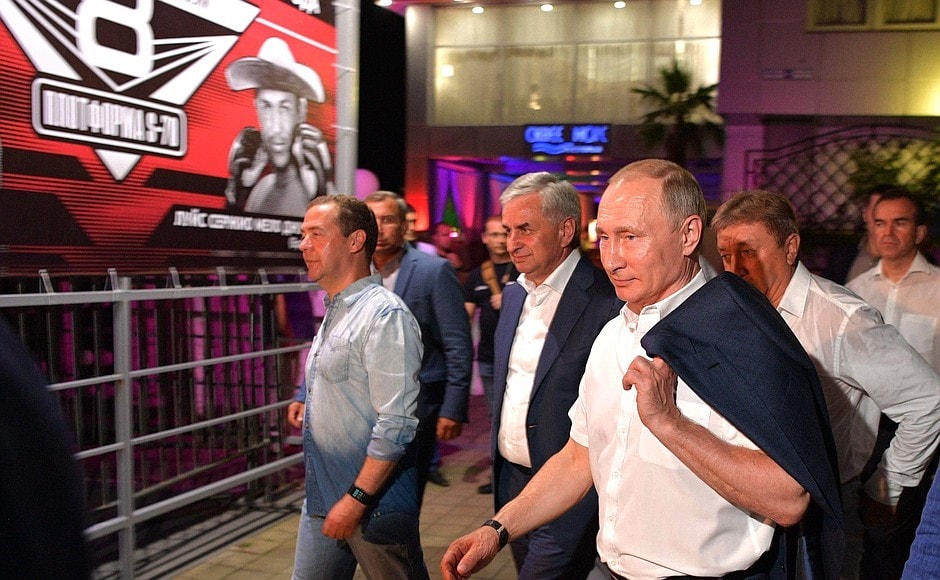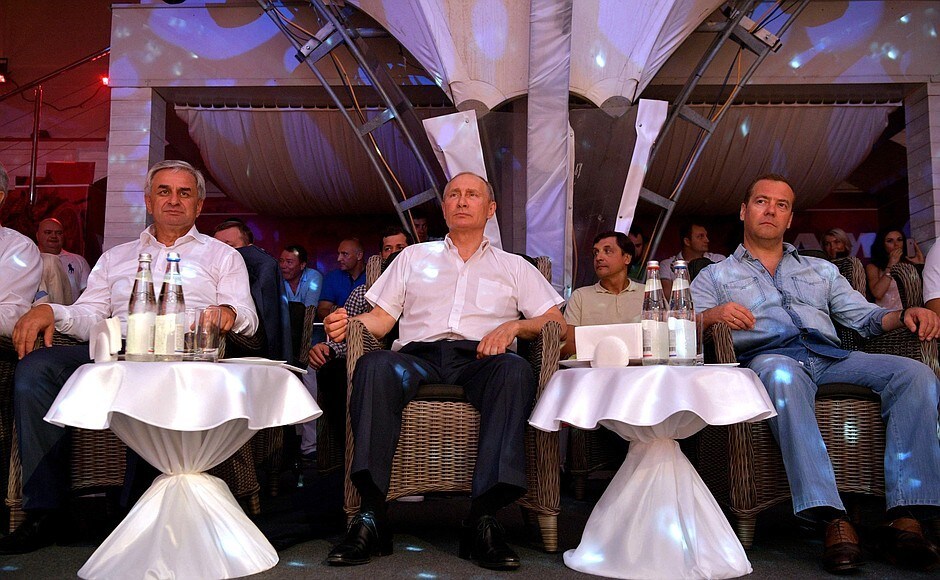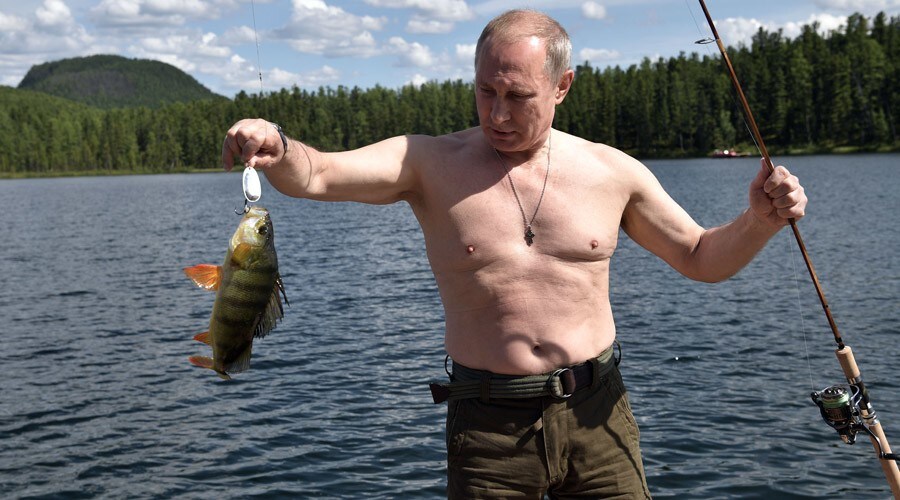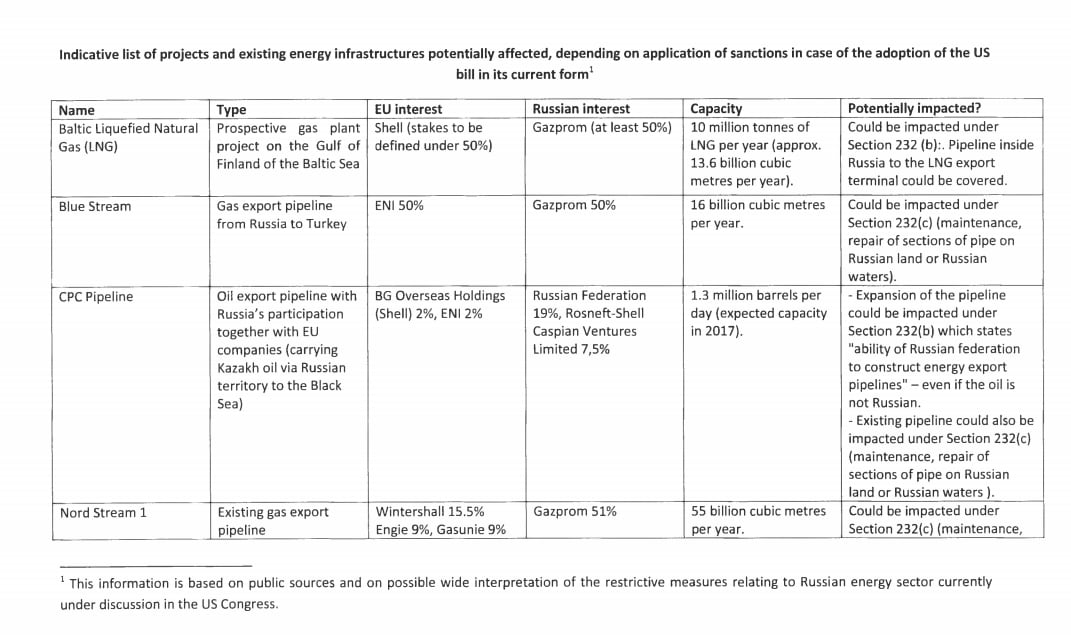Russia This Week – August 4-11, 2017
Russia This Week is a weekly review by the MEMRI Russian Media Studies Project, covering the latest Russia-related news and analysis from media in Russia, the Caucasus, Central Asia, and Eastern Europe.

Cartoon Of The Week:

Photomontage of Ivanka and Melania Trump checking their smartphones for photos of Putin vacationing in Siberia. (Vk.com/politics_today, August 8, 2017)
Photos Of The Week

On August 9, 2017. Russian President Vladimir Putin attends the VIII International Sambo Tournament, devoted to the Soviet martial art and combat sport
(Source: Kremlin.ru)

Russian President Vladimir Putin and Russian PM Dmitry Medvedev at the VIII International Sambo Tournament, devoted to the Soviet martial art and combat sport. (Source: Kremlin.ru)

Putin on vacation in Siberia, August 7, 2017. (Source: Rt.com)
Zakharova Dixit
Russian Foreign Ministry spokesperson Maria Zakharova is one of the most-quoted Russian officials. She is known for using colorful language when describing Russian foreign policy in her weekly press briefings. The following are Zakharova’s quotes of the week:

(Source: Instagram.com/mzakharovamid)
Commenting on the sanctions, Zakharova wrote on her Facebook account: “Goodbye, America? Immediately after Russia responded [to American sanctions by expelling American diplomatic staff], the Americans started to scare Russian citizens by complicating and delaying the issue of American visas… What were, and are, hundreds of American employees doing in Russia? For a diplomat this question is indecent. But the whole situation has long ago been falling out of the basket of delicacies… So, what did American diplomats do in Russia? Perhaps they have improved the system of issuing visas by speeding up this process? And now attention, drum roll. In the past 4-5 months, the time period for issuing a US visa has increased 4-5 times… if previously, the notorious visa interview took place approximately ten days after all documents were submitted, now, the applicant is invited for an interview after 6-7 weeks… If the American bureaucracy is unable or unwilling to deal with visas… We are ready to lend colleagues a helping hand in this issue, for example, to share the experience.”
(Facebook.com/maria.zakharova.167, August 1, 2017; Themoscowtimes.com, August 2, 2017)
Quotes Of The Week
Political analyst Sergey Kostyaev wrote in Novaya Gazeta:
“For official Moscow, the most painful sections of the [U.S.] law [imposing sanctions on Russia] are: reporting on elites close to Putin, which may broaden the list of Russian businessmen whose entry to the U.S. may be prohibited (art. 241), the possibility of imposing sanctions on state loans (art. 242), restrictions on virtually any cooperation (art. 235) regarding oil export and gas-pipelines (art.232). The last article is an especially painful blow for the Europeans, who last year got 37.5% of their gas supply from Russia. The construction of the new pipelines is becoming uncertain, as well as modification and repair of the existing pipelines.”
(Novayagazeta.ru, July 8, 2017)
Recently, Sergey Mironov, the leader of the Just Russia party proposed retaliatory measures in response to the new round of U.S. sanctions:
“Our shop shelves are heaped with foreign brands. Why do we need PepsiCo, Coca-Cola and Mars corporations’ products, crammed with God knows what, here in Russia? Home producers of non-alcoholic drinks, dairy, snacks, confectionery will happily fill the Russian market with their products… War is war. And in case of Russia, the aggressor has to understand that the stronger they hit, the stronger is the retaliation. How should we respond? First, we should withdraw our foreign exchange reserves from the US Treasury bonds.”
(Sputniknew.com, August 9, 2017)
In The News
Sanctions And Pipelines
Section 232 of the U.S. bill signed into law, imposing new sanctions on Russia, seeks to reduce Russia’s ability to build gas pipelines. The section was also criticized by EU leaders, since projects and existing energy infrastructures involving EU companies may be sanctioned as well.
Section 232 states:
“The President, in coordination with allies of the United States, may impose five or more of the sanctions described in section 235 with respect to a person if the President determines that the person knowingly, on or after the date of the enactment of this Act, makes an investment described in subsection (b) or sells, leases, or provides to the Russian Federation, for the construction of Russian energy export pipelines, goods, services, technology, information, or support described in subsection (c)—
“(1) any of which has a fair market value of $1,000,000 or more; or
“(2) that, during a 12-month period, have an aggregate fair market value of $5,000,000 or more.
“(b) Investment Described.—An investment described in this subsection is an investment that directly and significantly contributes to the enhancement of the ability of the Russian Federation to construct energy export pipelines.
“(c) Goods, Services, Technology, Information, Or Support Described.—Goods, services, technology, information, or support described in this subsection are goods, services, technology, information, or support that could directly and significantly facilitate the maintenance or expansion of the construction, modernization, or repair of energy export pipelines by the Russian Federation.”
Furthermore, section 257 specifically mentions a major Russian-European project “it is the policy of the United States… to continue to oppose the NordStream 2 pipeline given its detrimental impacts on the European Union’s energy security, gas market development in Central and Eastern Europe, and energy reforms in Ukraine.”
It should be noted that the law does not sanction a priori any business doing business with Russia’s gas sector, but gives the U.S. President the right to determine whether a business should be sanctioned. The following is an indicative list of projects and existing energy infrastructures potentially affected by the new U.S. law. The list was published by the European media platform Euractiv.eu:

The Impact Of Sanctions On The Russian Economy
Section 242 requires the compilation of a report on the effects of expanding sanctions to include sovereign debt and derivative products.
Section 242 specifies:
“Not later than 180 days after the date of the enactment of this Act, the Secretary of the Treasury, in consultation with the Director of National Intelligence and the Secretary of State, shall submit to the appropriate congressional committees a report describing in detail the potential effects of expanding sanctions under Directive 1 (as amended), dated September 12, 2014, issued by the Office of Foreign Assets Control under Executive Order No. 13662 (79 Fed. Reg. 16169; relating to blocking property of additional persons contributing to the situation in Ukraine), or any successor directive, to include sovereign debt and the full range of derivative products…”
If the expectation in Congress is that sanctions will quickly bring Russia to its knees, some of the leading financial services cast doubt on that prospect. Bloomberg wrote:
“What’s the impact on the Russian economy?
“Less than dramatic, from all appearances. Restrictions on Russian access to Western financing and technology could put a cap on the country’s already lackluster growth prospects as it emerges from the longest recession this century. And Russian markets took a hit for several weeks as the sanctions bill made its way through the U.S. Congress. But Russian bonds, stocks and the ruble all strengthened after Trump signed the sanctions legislation. That suggests the impact is ‘likely to be limited’ and has already been discounted, while damage to sentiment should gradually dissipate, HSBC analysts led by John Lomax said in an emailed note.”
(Bloomberg.com, August 3, 2017)
A the same time, Russia’s Analytical Credit Rating Agency (ACRA) reported that from the time that sanctions were imposed on Russia, the share of debt liabilities susceptible to forced repayment has dropped from 15% to 13%. The estimated maximum share of debt assets whose liquidity may be impaired in the case of expanded sanctions is 21.5%.
(Acra-ratings.com, July 27, 2017)
New EU Sanctions
Although the EU is concerned about the new U.S. sanctions, Brussels as well has imposed new sanctions. On August 4, the EU imposed new sanctions over the delivery of Siemens’ turbines to Russia-annexed Crimea. Euronews.com noted: “The latest tightening comes in response to the delivery of Siemens’ gas turbines to Crimea in violation of EU sanctions, which bar doing business there since the annexation that has not been internationally recognized. Siemens says it has evidence that all four turbines it delivered for a project in southern Russia had been illegally moved to Crimea.” Russian Vice-Minister for Energy, Andrey Cherezov is among the sanctioned people.
(Euronews.com, August 4, 2017)
The Russian Foreign Ministry commented: “We deeply regret the decision by Brussels to include a number of Russian officials and companies in the EU sanctions list as a countermeasure for the allegedly ‘illegal’ delivery of Siemens gas turbines to Crimea. We consider this Berlin-initiated step unfriendly and unfounded. It seems our German colleagues have adopted the practice of a broad interpretation of sanctions restrictions, which directly contradicts both international law and the principles of international relations as a whole.
“The EU and the German Government are fully responsible for this decision, including the potential economic losses of Siemens and other German and European companies operating in Russia. We believe the reasons for introducing a new package of restrictive measures against our country are utterly far-fetched and reserve the right to take retaliatory measures.
“We are disappointed by the absurd politicization of an issue that in reality represents a business dispute between economic entities. We are also resolutely rejecting the attempts to use it as an example of the ostensibly unfair practices of Russian companies.
“Despite these developments, we are affirming our interest in maintaining and steadily developing economic cooperation with Germany and the EU in general. We are committed to all of our pledges and hope to overcome jointly the negative consequences of sanctions.”
(Mid.ru, August 4, 2017)
The following is the Council’s decision on the new round of EU sanctions against Russia:
COUNCIL DECISION (CFSP) 2017/1418 of 4 August 2017
THE COUNCIL OF THE EUROPEAN UNION,
Having regard to the Treaty on European Union, and in particular Article 29 thereof,
Having regard to Council Decision 2014/145/CFSP of 17 March 2014 concerning restrictive measures in respect of actions undermining or threatening the territorial integrity, sovereignty and independence of Ukraine…
(2) As part of the Union’s non-recognition policy of the illegal annexation of Crimea and Sevastopol, the supply of key equipment for the creation, acquisition or development of infrastructure projects in Crimea and Sevastopol in important sectors, including energy, has been prohibited by the Council.
(3) Gas turbines, which are a substantial element in the development of new power plants in Crimea, have been supplied from Russia in breach of the contractual provisions for the original sale of the turbines from a company established in the Union to Russia.
(4) The purpose of those power plants is to establish an independent power supply for Crimea and Sevastopol, thus supporting their separation from Ukraine and undermining the territorial integrity, sovereignty and independence of Ukraine. Moreover, this action undermines the Union’s non-recognition policy of the illegal annexation of Crimea and Sevastopol.
(5) In view of the above, additional persons, entities and bodies should be added to the list of persons, entities and bodies subject to restrictive measures as set out in the Annex to Decision 2014/145/CFSP…
- Russian ViceMinister for Energy, Andrey Vladimirovich CHEREZOV: Shares responsibility for the decision to transfer gas turbines that had been delivered by Siemens Gas Turbine Technologies OOO to OAO VO Technopromexport, to be installed in Crimea. This decision contributes to establishing an independent power supply for Crimea and Sevastopol as a means of supporting their separation from Ukraine, and undermines the territorial integrity, sovereignty and independence of Ukraine.
- Russian Head of Department in the Energy Ministry, Evgeniy Petrovich GRABCHAK: Responsible within the Russian Ministry of Energy for the development of electroenergetic projects in Crimea…
- Sergey Anatolevich TOPORGILKA, Director General of OAO ‘VO TPE’ until its insolvency, Director General of OOO ‘VO TPE’: In his capacity as Director General of OOO ‘VO TPE’, he led the negotiations with Siemens Gas Turbine Technologies OOO regarding the purchase and delivery of the gas turbines for a power plant in Taman, Krasnodar region, Russian Federation. He was responsible for the transfer of the gas turbines to Crimea…
- OAO ‘VO Technopromexport’ (OAO ‘VO TPE’), AKA: Open Joint Stock Company ‘Foreign Economic Association’‘Technopromexport’: Contracting party with Siemens Gas Turbine Technologies OOO, OAO ‘VO TPE’ purchased gas turbines declared to be destined for a power plant in Taman, Krasnodar region, Russian Federation, and as the contractor was responsible for the transfer of the gas turbines to OOO ‘VO TPE’ which in turn transferred them to be installed in Crimea…
- OOO ‘VO Technopromexport’ (OOO ‘VO TPE’), AKA: Limited Liability Company ‘Foreign Economic Association’‘Technopromexport’: Current owner of the gas turbines originally supplied by Siemens Gas Turbine Technologies OOO to OAO ‘VO TPE’. OOO ‘VO TPE’ transferred the gas turbines to be installed in Crimea…
- ZAO Interavtomatika (IA): Company specialised in control and communication systems for power plants, which has entered into contracts for projects concerning the building of the power plants and the installation of gas turbines in Sevastopol and in Simferopol…
(Eur-lex.europa.eu/legal-content/EN/TXT/?uri=CELEX:32017D1418)
Former U.S. Base In Kyrgyzstan Now A Russian Base
In July, Kygyzistan President Almazbek Atambayev commented on the reasons for closing the U.S. airbase back in 2014, which was opened in Bishkek in 2001 after 9/11 to assist U.S. forces in Afghanistan battling the Taliban. Atambayev said: “To be honest, some countries warned us they were ready, if necessary, to use missiles against the U.S. airbase, which Kyrgyzstan hosted… To that time, our people were under a major threat.”
Russian news agency TASS also reported: “Kyrgyzstan had signed an agreement with Russia to host its airbase… However, the new agreement with Russia reads that the term of hosting the Russian military is ‘cut from 74 to 15 years.'”
(Tass.com, July 24, 2017)
This article is republished with permission from our friends at The Middle East Media Research Institute.
Utah Standard News depends on the support of readers like you.
Good Journalism requires time, expertise, passion and money. We know you appreciate the coverage here. Please help us to continue as an alternative news website by becoming a subscriber or making a donation. To learn more about our subscription options or make a donation, click here.
To Advertise on UtahStandardNews.com, please contact us at: ed@utahstandardnews.com.



Comments - No Responses to “Russia This Week – August 4-11, 2017”
Sure is empty down here...